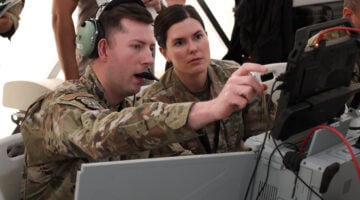
WASHINGTON: DoD leaders are still hammering out differences between the Office of the Secretary of Defense (OSD) and the Air Force about how to revamp space acquisition authorities under a new secretary, senior DoD and Air Force officials say.
“There are some places that will have some interesting dialogue,” says Shawn Barnes, who is effectively running the new office of the assistant secretary for space acquisition and integration mandated in the 2020 National Defense Authorization Act (NDAA).
As Breaking D readers know, DoD and the Air Force initially opposed the idea of a new space acquisition czar separate from the Air Force chain of command. Nonetheless, the Pentagon has been considering bringing Space and Missile Systems Center, Space Development Agency and the Space Rapid Capabilities Office together under a new Space Force entity called Space Systems Command.
However, there has been internal disagreement on how to reorganize authorities that now reside under Roper for SMC, Undersecretary for Research & Engineering Mike Griffin for SDA, and Barrett for SpRCO. In particular, there has been some question of whether SDA will move under the Space Force or stay underneath Griffin’s shop.
Further, some members of Congress have expressed concerns about the plan to integrate SpRCO into a consolidated space acquisition office, given that Congress in the 2018 NDAA established it specifically as independent of the normal acquisition chain of command.
The NDAA requires DoD to name a new, Senate-confirmed assistant secretary to oversee space acquisition by the new Space Force — separate from the current Air Force acquisition process led by Will Roper. That person will oversee the Space and Missile Systems Center (SMC), the Space Rapid Capabilities Office (SpRCO), and the nascent Space Development Agency (SDA). In October 2022, whoever holds that position will also become the Air Force service acquisition executive for space systems and programs. That means the majority of space acquisition will not be overseen by Roper, unless he is named to that position.
Air Force Secretary Barrett, speaking at a Mitchell Institute event this morning, said the Air Force is first concentrating on building a future space acquisition system that “we’re going to want to live under” before vetting any candidates for the new position.
Barnes told reporters after the event that DoD owes Congress two different reports on space acquisition — one from Defense Secretary Mark Esper that is being spearheaded by DoD acquisition chief Ellen Lord, and another being crafted by the Air Force for Barrett’s signature.
“There are two different documents, and I would say that the documents complement each other,” Barnes said. “First of all, in the 2019 NDAA Congress asked the Secretary of Defense to provide a report. That report is effectively written, and I would expect that Undersecretary Lord will sign that out to Congress here in the next few weeks.”
That report, he said, will primarily review the changes OSD has effected over the past couple of years to streamline space acquisition under existing legal authorities, such as the use of Section 804. What it will not do is to identify additional legislative authorities that DoD might want in setting up the new space acquisition structure.
The Air Force report will propose further legislative changes to give the service more flexibility in how it shapes space acquisition, he said.
The report will inform Congress about “a combination of additional internal reforms within the Department of Defense, some of which are in the Joint Staff in requirements, some of which are in the Air Force, some of which are within OSD — but also [include] some pieces that would require some additional legislative adjustments as well,” Barnes said. “Those would go beyond the flexibility that OSD already been provided” by Congress in current law to speed contracting.
One senior DoD official told me that the two reports “are now in coordination,” and that a resolution of the differences will likely go down to the wire. Further, several sources have indicated that the March report to Congress is unlikely to be the last word on the space acquisition issue — due to internal debate over who should be in control of what budget pots.
Indeed, Space Force Vice Commander Lt. Gen. David Thompson told the Air Force Association’s annual winter meeting in late February that the report would “make recommendations for what a new acquisition approach should look like,” but he added, it would not dot ever i and cross every t.

